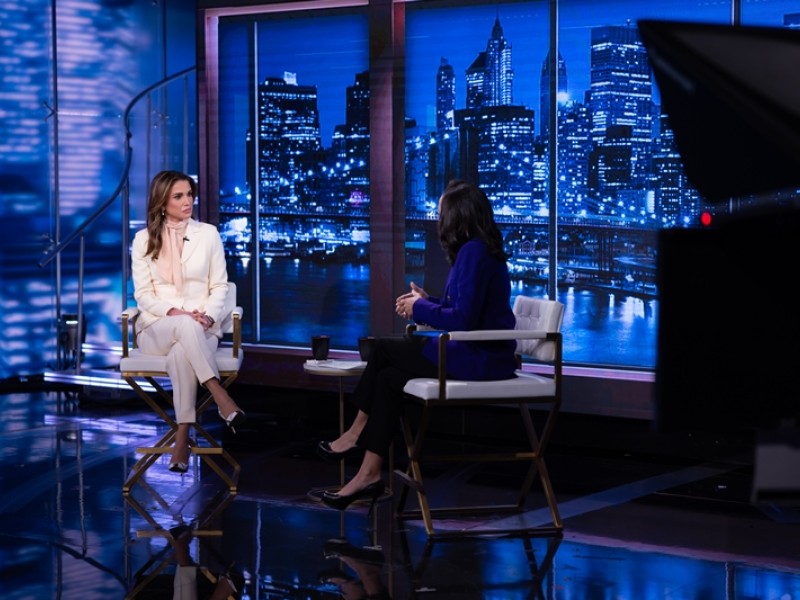Queen Rania's Interview with Bloomberg

HMQ: I must say that you know a trickle of aid is flowing where torrents should be surging you know. And that’s one of the reasons why I want to highlight this issue here because politicians need to stick to the promises that they made. They need to stick to their consciences and their convictions. A lot of the aid that was promised actually has been exaggerated, through a smoke and mirrors kind of aid reporting. Basically some of the new and additional aid that has been promised during the financial crisis has been reported, is actually old aid that has been promised but just repackaged. So I think we really need to double our efforts. What I would say about this is that cutting aid for education may save taxpayers in developed countries a few pennies but it can cost the young children in developing nations their whole future. And in our economies growth will return, people will get their jobs back, but you only have one chance at a childhood. Once you miss your chance to get an education you’re never going to recover that. And the converse is true once you have your education then it’s always going to be by your side and no one can take it away from you. So I think there is a moral as well as a business case for educating, for providing people with an education, why it should be a priority, and why I hope the leaders of the G8 and others to push forward and come through with the promises they made to deliver on education.
Margaret Brennan (MB): One of the issues related to this topic that I know we’re struggling with in the United States, but it also seems to be a common theme around the world, is where the initiative comes for those educational programmes to what degree the private sector should be engaged in funding that, in helping to determine what should be on the agenda for most schools and educational programmes and to what degree the state needs to take the leadership on that.
HMQ: I would say that you know non-governmental organisations and private sector organisations should be partners with the government when it comes to education because it’s very important that our children have the kind of skills that the workplace requires once they graduate. It’s not enough to get children in to school, it’s what they get out of school that matters. And increasingly the business world today wants employees that are entrepreneurial, creative, adaptable, can, are very flexible and can keep ahead of changing market trends, And to be able to get that kind of individual you need a really good quality education and highly trained teachers. You need the highly trained teachers to really give the skills to these students and prepare them for jobs that don’t exist yet you now. So increasingly I think the business world realises that they have a really high stake in the quality of the education because it determines the quality of their future employees. It’s very simple you know, a good education means good future employees which means higher productivity which means more profit. And that’s just that’s just the way it is. We all understand that you know human capital is king and the best way to build it is through our schools and our universities...
HMQ: ...I personally believe that as long as a woman wears the hijab because it’s her personal choice then I’m a staunch defender of a woman wearing the hijab just as I am a staunch defender of a woman choosing not to wear the hijab. It is a personal choice. It’s your relationship with God and that’s a very personal thing. It is the right of every country to ensure the safety and security of that country and to ensure that there is harmony amongst its people. As you mentioned immigration has changed the way our communities look now. They’ve become so diversified. And the issue of integration has become one that people are grappling with. You know how do you integrate societies in to your country. But every group has to realise that they have to respect the law of the land in which they reside. And they have to respect the norms and the culture of that country. Not at the expense of their own but there needs to be that kind of balance achieved where you can preserve your personal freedom and you don’t feel that you’re being targeted. And you have equal rights and equal opportunities in the country in which you reside but at the same time you give back to that country by respecting its laws, it norms and its culture. So it’s a symbiotic relationship. Each side has responsibilities to the other and it takes trust between both sides to make it work. And a sense that the other side has good intentions. It’s when groups feel that they are targeted or marginalised that they crawl in to their own shell and they and that’s a very unhealthy kind of situation. As I said earlier communication is the only way to break down these boundaries. Communication in good faith explaining what the intention is behind those decisions is absolutely crucial.
MB: You’ve been very active and proactive in getting your message out. You have a You Tube channel, to talk about, as has been reported, to dissipate some of the stereotypes about Arab and Muslim women. You also Twitter.
HMQ: I found that I can, my virtual self, can get closer to people more easily than my real self. I think people sometimes feel that they have to be a bit more formal with me, or not really say what they really think. Social media also helps me in raising awareness about some of my issues and rallying support. So for example on education I use my Twitter to just send messages about education that can educate people about education really. And it really really helps to get momentum behind a lot of the work that I do. I personally really enjoy it and I feel like I’m part of a community and more and more I think we’re seeing how social media is having an effect on the real world. So it’s having, I think it’s, online activism is trying to break out of its digital boundaries and have a real effect on the world, And we saw that for example in the aftermath of the earthquake in Haiti where the twin forces of texting and Twitter meant that organisations like the American Red Cross in the first two days after the earthquake were able to raise more in donations than in the aftermath of Hurricane Katrina or the Asian Tsunami.
Featured
Queen Rania's official website
This website does not support old browsers. To view this website, Please upgrade your browser to IE 9 or greater
Your browser is out of date. It has known security flaws and may not display all features of this and other websites. Learn how to update your browser



